Google's Dragonfly -- Still Buzzing Around?


One of the most amazing things about the Internet is the amount of information that we can find on it. From what the weather will be like tomorrow to answers to various existential crises, someone has said something about it on the Internet.
Where do you go to find this and other information? If you are one of the 77 percent of the 1.52 billion search engine users worldwide, you are probably using Google. If you think about your use of Goggle (not many do), you may not trust it completely. But you trust it enough to use it to find out the answer to your latest question.
What if we told you that Google was systematically feeding you answers that the government (whoever that may be) had pre-approved for your information? How much would you trust it then?
Google has already made moves in that direction and the game may not be as clear as they say. Let’s take a closer look at what has happened and where we see this going in the future.
Project Dragonfly: Google and China’s Collaboration.
In 2018, the public heard about a new project between Google and the Chinese government, called Dragonfly. Dragonfly in brief was to be a new search engine, powered by Google—and controlled by the Chinese government, who would act as a censor of all the content Dragonfly would pull from the World Wide Web.
On August 1st of that year, the Intercept released an astonishing article (which some of you may have read at the time) informing the rest of the Web about Dragonfly. In that article, they said that they had been given access to documents marked “Google confidential” by a person who had “moral and ethical concerns about Google’s role in the censorship, which is being planned by a handful of top executives and managers at the company with no public scrutiny.” (The Intercept, 2018)
Further study of these documents revealed among other things:
- The proposed search engine would automatically block and filter content according to China’s “Great Firewall” that the government has set up.
- Certain searches (containing “sensitive keywords”) would come up as blank—no results would be shown at all
- Some websites, including Wikipedia and the BBC, would be completely removed from the results
- And more.
The Follow-up by Google
When the news hit the Web, Google reacted in two major ways. First of all, the then-CEO and one of the co-founders stated that the technology behind the proposed search engine was in the very first stages and was “exploratory.” Other statements included the fact that the company felt badly about compromising the personal values of the employees and the “kerfuffle” that such actions caused.
On the other side of the coin, Google employees lashed back by leaving the company and sharing their opinions about the Dragonfly project. After some coverage by various media sources and further discussion, the talk quietly drifted away.
But did the project really end?
What Happens Now?
In March 2019, the Intercept broke a new story over Dragonfly. It’s not dead.
Worried Google employees had continued to check up on the project due to unclear communication and lack of information from leadership. Now, the Intercept states that “The group has identified ongoing work on a batch of code that is associated with the China search engine, according to three Google sources.” (The Intercept, March 3rd, 2019)
Regardless of what Google and other official sources have said, the fact is that the genie is out of the bottle. The power to govern what people can and cannot find on the Internet via the Google search engine and the people behind the engine is present and very real.
Here at EDG, we believe that we as a world have a right to know when we are being denied information. Are we? We don’t know. But we are going to keep looking for the truth and raising the question: What don’t we know?
Will you join us in questioning the status quo?

Don't be evil, use ethical search engines and products that respect privacy.
(Image created by Mark W. Marasch)
A Call to Action by Mark W. Marasch:
I hope you enjoyed Grace's article above. It should be clear that Ethical Developer Group is very concerned about online privacy. We believe that the majority of Web users are compromising their private information every day by using wolf-in-sheep's-clothing services including Google, and normal operating systems like Windows and Android.
Please join us in learning about the threat and finding our way out of the Digital Panopticon by signing up for our email updates, becoming a user of the site, and showing your support of our mission on social media sites including LinkedIn and Twitter.
Thanks!
Posted from my blog with SteemPress : https://edgcert.com/2019/03/30/dragonfly_buzzing/